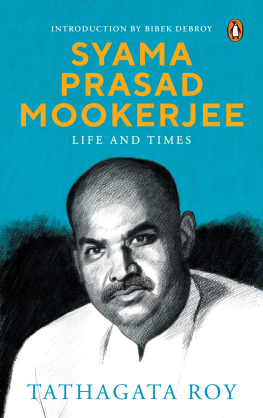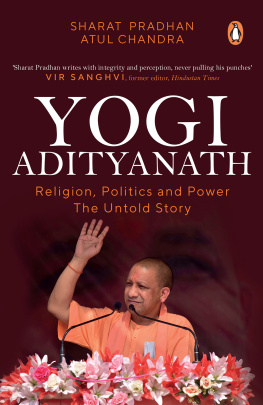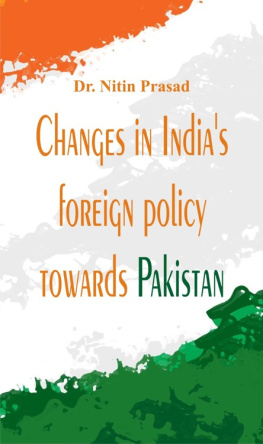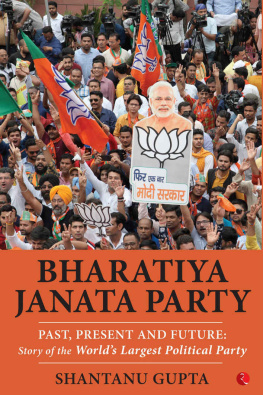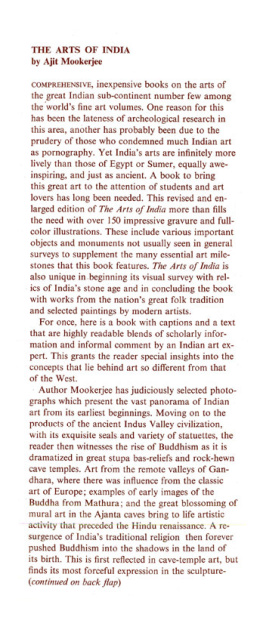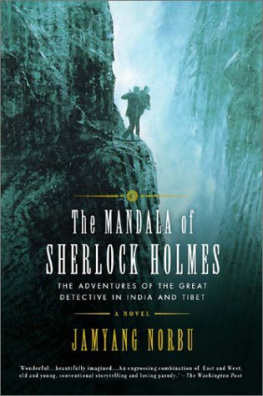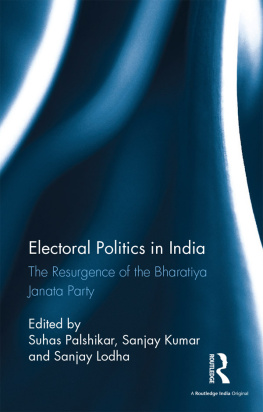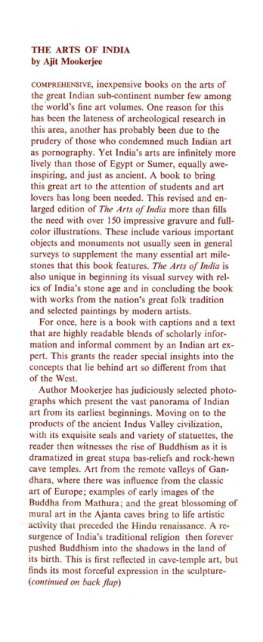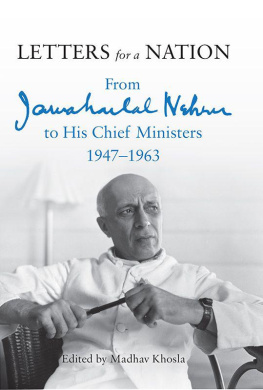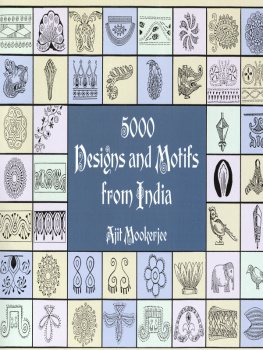In his public life he was never afraid of expressing his inmost convictions. In silence the cruellest lies are told. When great wrongs are committed it is criminal to be silent in the hope that truth will one day find its voice. In democratic society one should speak out, especially when we are developing an unequalled power of not seeing what we do not wish to see.
Dr Sarvepalli Radhakrishnan, in his condolence message after Dr Mookerjee passed away
Foreword
T athagata Roy, the author of this book, was the president of our partys West Bengal unit at one point of time. When he met me in Kolkata he presented to me his manuscript of Dr Syama Prasad Mookerjees biography and requested me to write a foreword for the book.
His request was an honour for me. I regard Dr Mookerjee as the first martyr for independent Indias unity and integrity.
I was born in 1927 in Karachi (now in Pakistan). In 1947, as a result of the sacrifices and struggles of thousands of patriots, India was able to wrest freedom from British rule. But the independence of our motherland was accompanied by the trauma of Partitionan event that witnessed the massacre of tens of thousands, and the uprooting of millions from their hearths and homes.
I left Karachi a month after Partition. My first ten years after Independence, from 1947 to 1957, were spent in Rajasthan. So when in 1951 Dr Mookerjee launched the Bharatiya Jana Sangh (BJS), a political party committed to nationalism, democracy and good governance, besides a polity based on Bharatiya sanskriti and values, many of us associated with the Rashtriya Swayamsevak Sangh (RSS) since childhood decided to join this new party and serve the country through politics.
I can list several young men, then in their twenties or early thirtiesPandit Deen Dayal Upadhyaya, Atal Bihari Vajpayee, Nanaji Deshmukh, Balraj Madhok, Yagya Dutt Sharma, Sunder Singh Bhandari, Jagannath Rao Joshi, Gopal Rao Thakur, Kailashpati Mishra, Vasant Rao Bhagwat, Nathabhai, Jagdish Prasad Mathur, P. Parameswaran, Ram Prasad Das, Kusha Bhau Thakre et al.along with whom I was also drawn into this first political party born after Independence.
The activists I have listed above together constituted a galaxy of highly talented youth, whose dedicated labour in those early decades of a developing democracy have today made the BJP a formidable force to be reckoned with.
As I have mentioned, at the time the Jana Sangh was founded, I was in Rajasthan. And within a couple of years of the partys launching, Dr Mookerjee defied the Jammu and Kashmir governments order forbidding him to enter the state. Midway on the bridge linking Punjab with Jammu and Kashmir state, Dr Mookerjee was arrested and taken to a place near Srinagar where he was kept in detention for a couple of months.
On 23 June 1953, the whole country was shocked to learn that after a short illness at his place of detention, Dr Mookerjee was shifted to the state hospital in Srinagar where after a brief while he breathed his last.
I was in Jaipur those days. I vividly remember how that morning around 4.30 a.m. I was woken up from sleep by the loud wailing sounds of someone outside our party office (he turned out to be a local newsman) who kept shouting, while weeping, Advaniji, theyve killed Dr Mookerjee!
Till today, it is a mystery how he died. Was proper medical assistance made available to him? Or was it a case of medical elimination? The then Chief Minister of West Bengal, Dr B.C. Roy, and Dr Syama Prasads revered mother, Jogomaya Devi, carried on a prolonged correspondence with Pandit Nehru urging that the tragedy be thoroughly probed and the full facts brought to light. Such a monumental tragedy occurred, and yet not even an inquiry was ordered.
Jogomaya Devis letter to Pandit Nehru in reply to his condolence message is really heart-rending. She wrote:
I am not writing to you to seek any consolation. But what I do demand of you is justice. My son died in detentiona detention without trial. In your letter you have tried to impress that Kashmir Government had done all that should have been done. You base your impression on the assurances and information you have received. What is the value, I ask, of such information when it comes from persons who themselves should stand trial? You say, you had visited Kashmir during my sons detention. You speak of the affection you had for him. But what prevented you, I wonder, from meeting him there personally and satisfying yourself about his health and arrangements?
His death is shrouded in mystery. Is it not most astounding and shocking that ever since his detention there, the first information that I, his mother, received from the Government of Kashmir was that my son was no more, and that also at least two hours after the end? And in what a cruel cryptic way the message was conveyed! Even the telegram from my son that he had been removed to the hospital reached us here after the tragic news of his death. There is definite information that my son had not been keeping well practically from the beginning of his detention. He had been positively ill a number of times and for successive periods. Why did not, I ask, the Government of Kashmir or your Government send any information whatsoever to me and my family?
We in the BJP owe our position in Indian politics to the sacrifices of thousands who have preceded us, and above all to the vision and martyrdom of Dr Mookerjee. We have known our great leader closely only during the closing years of his life. Tathagata Roy has done a signal service to history and to the nationalistic cause we are pursuing in politics by doing all the research work he could. He has compiled voluminous details about this great heros life, right from his birth and preparing what he has called a complete biography. All compliments to him.
New Delhi
L.K. Advani
June 2012
Introduction
I n October 2017, there was a question on the Kaun Banega Crorepati show, Which member of Jawaharlal Nehrus cabinet resigned and founded a new party in 1951? It wasnt one of the early-rung questions. Even then, I was surprised when the participant got the answer right. Perhaps I am being unfair. But I suspect, twenty years ago, in a similar situation, not too many participants would have known. Independent Indias discourse has been shaped in a certain way. Moulded through that jaundiced view, Dr Syama Prasad Mookerjee hasnt got his due. The naming of educational institutions, roads, bridges, buildings, swimming pools, towns and schemes after him is a relatively recent phenomenon. Perhaps the only exception is the University of Delhis Shyama Prasad Mukherji (spelt thus) College. However, even for this college, the preference seems to be to refer to it as SPM College, as if one has Suspended Particulate Matter in mind. Had it not been for SPM, not only Indias legacy, independent Indias geography too would have been remarkably different. More likely than not, the state of Punjab would have been part of Pakistan and the state of West Bengal would have been part of Bangladesh. This may sound exaggerated, but it is part of documented history. If this sounds exaggerated, thats because of Dr Syama Prasad Mookerjees marginalization in popular renderings of Indias Independence movement and because good books on him are rare.

